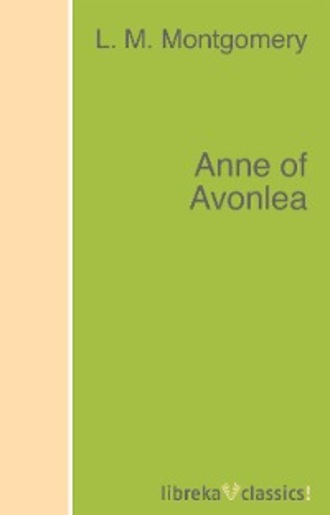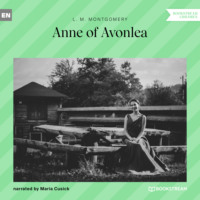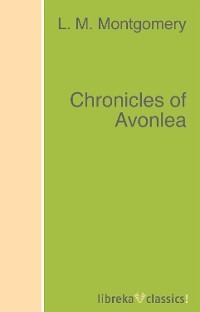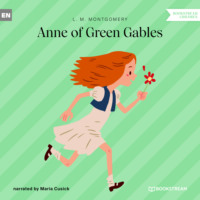
Полная версия
Anne of Avonlea
Diana shook her head.
"I never imagine things like that about places now, Anne. Don't you remember how cross mother and Marilla were when we imagined ghosts into the Haunted Wood? To this day I can't go through that bush comfortably after dark; and if I began imagining such things about the old Boulter house I'd be frightened to pass it too. Besides, those children aren't dead. They're all grown up and doing well . . . and one of them is a butcher. And flowers and songs couldn't have ghosts anyhow."
Anne smothered a little sigh. She loved Diana dearly and they had always been good comrades. But she had long ago learned that when she wandered into the realm of fancy she must go alone. The way to it was by an enchanted path where not even her dearest might follow her.
A thunder-shower came up while the girls were at Carmody; it did not last long, however, and the drive home, through lanes where the raindrops sparkled on the boughs and little leafy valleys where the drenched ferns gave out spicy odors, was delightful. But just as they turned into the Cuthbert lane Anne saw something that spoiled the beauty of the landscape for her.
Before them on the right extended Mr. Harrison's broad, gray-green field of late oats, wet and luxuriant; and there, standing squarely in the middle of it, up to her sleek sides in the lush growth, and blinking at them calmly over the intervening tassels, was a Jersey cow!
Anne dropped the reins and stood up with a tightening of the lips that boded no good to the predatory quadruped. Not a word said she, but she climbed nimbly down over the wheels, and whisked across the fence before Diana understood what had happened.
"Anne, come back," shrieked the latter, as soon as she found her voice. "You'll ruin your dress in that wet grain . . . ruin it. She doesn't hear me! Well, she'll never get that cow out by herself. I must go and help her, of course."
Anne was charging through the grain like a mad thing. Diana hopped briskly down, tied the horse securely to a post, turned the skirt of her pretty gingham dress over her shoulders, mounted the fence, and started in pursuit of her frantic friend. She could run faster than Anne, who was hampered by her clinging and drenched skirt, and soon overtook her. Behind them they left a trail that would break Mr. Harrison's heart when he should see it.
"Anne, for mercy's sake, stop," panted poor Diana. "I'm right out of breath and you are wet to the skin."
"I must . . . get . . . that cow . . . out . . . before . . . Mr. Harrison . . . sees her," gasped Anne. "I don't . . . care . . . if I'm . . . drowned . . . if we . . . can . . . only . . . do that."
But the Jersey cow appeared to see no good reason for being hustled out of her luscious browsing ground. No sooner had the two breathless girls got near her than she turned and bolted squarely for the opposite corner of the field.
"Head her off," screamed Anne. "Run, Diana, run."
Diana did run. Anne tried to, and the wicked Jersey went around the field as if she were possessed. Privately, Diana thought she was. It was fully ten minutes before they headed her off and drove her through the corner gap into the Cuthbert lane.
There is no denying that Anne was in anything but an angelic temper at that precise moment. Nor did it soothe her in the least to behold a buggy halted just outside the lane, wherein sat Mr. Shearer of Carmody and his son, both of whom wore a broad smile.
"I guess you'd better have sold me that cow when I wanted to buy her last week, Anne," chuckled Mr. Shearer.
"I'll sell her to you now, if you want her," said her flushed and disheveled owner. "You may have her this very minute."
"Done. I'll give you twenty for her as I offered before, and Jim here can drive her right over to Carmody. She'll go to town with the rest of the shipment this evening. Mr. Reed of Brighton wants a Jersey cow."
Five minutes later Jim Shearer and the Jersey cow were marching up the road, and impulsive Anne was driving along the Green Gables lane with her twenty dollars.
"What will Marilla say?" asked Diana.
"Oh, she won't care. Dolly was my own cow and it isn't likely she'd bring more than twenty dollars at the auction. But oh dear, if Mr. Harrison sees that grain he will know she has been in again, and after my giving him my word of honor that I'd never let it happen! Well, it has taught me a lesson not to give my word of honor about cows. A cow that could jump over or break through our milk-pen fence couldn't be trusted anywhere."
Marilla had gone down to Mrs. Lynde's, and when she returned knew all about Dolly's sale and transfer, for Mrs. Lynde had seen most of the transaction from her window and guessed the rest.
"I suppose it's just as well she's gone, though you DO do things in a dreadful headlong fashion, Anne. I don't see how she got out of the pen, though. She must have broken some of the boards off."
"I didn't think of looking," said Anne, "but I'll go and see now. Martin has never come back yet. Perhaps some more of his aunts have died. I think it's something like Mr. Peter Sloane and the octogenarians. The other evening Mrs. Sloane was reading a newspaper and she said to Mr. Sloane, 'I see here that another octogenarian has just died. What is an octogenarian, Peter?' And Mr. Sloane said he didn't know, but they must be very sickly creatures, for you never heard tell of them but they were dying. That's the way with Martin's aunts."
"Martin's just like all the rest of those French," said Marilla in disgust. "You can't depend on them for a day." Marilla was looking over Anne's Carmody purchases when she heard a shrill shriek in the barnyard. A minute later Anne dashed into the kitchen, wringing her hands.
"Anne Shirley, what's the matter now?"
"Oh, Marilla, whatever shall I do? This is terrible. And it's all my fault. Oh, will I EVER learn to stop and reflect a little before doing reckless things? Mrs. Lynde always told me I would do something dreadful some day, and now I've done it!"
"Anne, you are the most exasperating girl! WHAT is it you've done?"
"Sold Mr. Harrison's Jersey cow . . . the one he bought from Mr. Bell . . . to Mr. Shearer! Dolly is out in the milking pen this very minute."
"Anne Shirley, are you dreaming?"
"I only wish I were. There's no dream about it, though it's very like a nightmare. And Mr. Harrison's cow is in Charlottetown by this time. Oh, Marilla, I thought I'd finished getting into scrapes, and here I am in the very worst one I ever was in in my life. What can I do?"
"Do? There's nothing to do, child, except go and see Mr. Harrison about it. We can offer him our Jersey in exchange if he doesn't want to take the money. She is just as good as his."
"I'm sure he'll be awfully cross and disagreeable about it, though," moaned Anne.
"I daresay he will. He seems to be an irritable sort of a man. I'll go and explain to him if you like."
"No, indeed, I'm not as mean as that," exclaimed Anne. "This is all my fault and I'm certainly not going to let you take my punishment. I'll go myself and I'll go at once. The sooner it's over the better, for it will be terribly humiliating."
Poor Anne got her hat and her twenty dollars and was passing out when she happened to glance through the open pantry door. On the table reposed a nut cake which she had baked that morning . . . a particularly toothsome concoction iced with pink icing and adorned with walnuts. Anne had intended it for Friday evening, when the youth of Avonlea were to meet at Green Gables to organize the Improvement Society. But what were they compared to the justly offended Mr. Harrison? Anne thought that cake ought to soften the heart of any man, especially one who had to do his own cooking, and she promptly popped it into a box. She would take it to Mr. Harrison as a peace offering.
"That is, if he gives me a chance to say anything at all," she thought ruefully, as she climbed the lane fence and started on a short cut across the fields, golden in the light of the dreamy August evening. "I know now just how people feel who are being led to execution."
III
Mr. Harrison at Home
Mr. Harrison's house was an old-fashioned, low-eaved, whitewashed structure, set against a thick spruce grove.
Mr. Harrison himself was sitting on his vineshaded veranda, in his shirt sleeves, enjoying his evening pipe. When he realized who was coming up the path he sprang suddenly to his feet, bolted into the house, and shut the door. This was merely the uncomfortable result of his surprise, mingled with a good deal of shame over his outburst of temper the day before. But it nearly swept the remnant of her courage from Anne's heart.
"If he's so cross now what will he be when he hears what I've done," she reflected miserably, as she rapped at the door.
But Mr. Harrison opened it, smiling sheepishly, and invited her to enter in a tone quite mild and friendly, if somewhat nervous. He had laid aside his pipe and donned his coat; he offered Anne a very dusty chair very politely, and her reception would have passed off pleasantly enough if it had not been for the telltale of a parrot who was peering through the bars of his cage with wicked golden eyes. No sooner had Anne seated herself than Ginger exclaimed,
"Bless my soul, what's that redheaded snippet coming here for?"
It would be hard to say whose face was the redder, Mr. Harrison's or Anne's.
"Don't you mind that parrot," said Mr. Harrison, casting a furious glance at Ginger. "He's . . . he's always talking nonsense. I got him from my brother who was a sailor. Sailors don't always use the choicest language, and parrots are very imitative birds."
"So I should think," said poor Anne, the remembrance of her errand quelling her resentment. She couldn't afford to snub Mr. Harrison under the circumstances, that was certain. When you had just sold a man's Jersey cow offhand, without his knowledge or consent you must not mind if his parrot repeated uncomplimentary things. Nevertheless, the "redheaded snippet" was not quite so meek as she might otherwise have been.
"I've come to confess something to you, Mr. Harrison," she said resolutely. "It's . . . it's about . . . that Jersey cow."
"Bless my soul," exclaimed Mr. Harrison nervously, "has she gone and broken into my oats again? Well, never mind . . . never mind if she has. It's no difference . . . none at all, I . . . I was too hasty yesterday, that's a fact. Never mind if she has."
"Oh, if it were only that," sighed Anne. "But it's ten times worse. I don't . . ."
"Bless my soul, do you mean to say she's got into my wheat?"
"No . . . no . . . not the wheat. But . . ."
"Then it's the cabbages! She's broken into my cabbages that I was raising for Exhibition, hey?"
"It's NOT the cabbages, Mr. Harrison. I'll tell you everything . . . that is what I came for—but please don't interrupt me. It makes me so nervous. Just let me tell my story and don't say anything till I get through—and then no doubt you'll say plenty," Anne concluded, but in thought only.
"I won't say another word," said Mr. Harrison, and he didn't. But Ginger was not bound by any contract of silence and kept ejaculating, "Redheaded snippet" at intervals until Anne felt quite wild.
"I shut my Jersey cow up in our pen yesterday. This morning I went to Carmody and when I came back I saw a Jersey cow in your oats. Diana and I chased her out and you can't imagine what a hard time we had. I was so dreadfully wet and tired and vexed—and Mr. Shearer came by that very minute and offered to buy the cow. I sold her to him on the spot for twenty dollars. It was wrong of me. I should have waited and consulted Marilla, of course. But I'm dreadfully given to doing things without thinking—everybody who knows me will tell you that. Mr. Shearer took the cow right away to ship her on the afternoon train."
"Redheaded snippet," quoted Ginger in a tone of profound contempt.
At this point Mr. Harrison arose and, with an expression that would have struck terror into any bird but a parrot, carried Ginger's cage into an adjoining room and shut the door. Ginger shrieked, swore, and otherwise conducted himself in keeping with his reputation, but finding himself left alone, relapsed into sulky silence.
"Excuse me and go on," said Mr. Harrison, sitting down again. "My brother the sailor never taught that bird any manners."
"I went home and after tea I went out to the milking pen. Mr. Harrison," . . . Anne leaned forward, clasping her hands with her old childish gesture, while her big gray eyes gazed imploringly into Mr. Harrison's embarrassed face . . . "I found my cow still shut up in the pen. It was YOUR cow I had sold to Mr. Shearer."
"Bless my soul," exclaimed Mr. Harrison, in blank amazement at this unlooked-for conclusion. "What a VERY extraordinary thing!"
"Oh, it isn't in the least extraordinary that I should be getting myself and other people into scrapes," said Anne mournfully. "I'm noted for that. You might suppose I'd have grown out of it by this time . . . I'll be seventeen next March . . . but it seems that I haven't. Mr. Harrison, is it too much to hope that you'll forgive me? I'm afraid it's too late to get your cow back, but here is the money for her . . . or you can have mine in exchange if you'd rather. She's a very good cow. And I can't express how sorry I am for it all."
"Tut, tut," said Mr. Harrison briskly, "don't say another word about it, miss. It's of no consequence . . . no consequence whatever. Accidents will happen. I'm too hasty myself sometimes, miss . . . far too hasty. But I can't help speaking out just what I think and folks must take me as they find me. If that cow had been in my cabbages now . . . but never mind, she wasn't, so it's all right. I think I'd rather have your cow in exchange, since you want to be rid of her."
"Oh, thank you, Mr. Harrison. I'm so glad you are not vexed. I was afraid you would be."
"And I suppose you were scared to death to come here and tell me, after the fuss I made yesterday, hey? But you mustn't mind me, I'm a terrible outspoken old fellow, that's all . . . awful apt to tell the truth, no matter if it is a bit plain."
"So is Mrs. Lynde," said Anne, before she could prevent herself.
"Who? Mrs. Lynde? Don't you tell me I'm like that old gossip," said Mr. Harrison irritably. "I'm not . . . not a bit. What have you got in that box?"
"A cake," said Anne archly. In her relief at Mr. Harrison's unexpected amiability her spirits soared upward feather-light. "I brought it over for you . . . I thought perhaps you didn't have cake very often."
"I don't, that's a fact, and I'm mighty fond of it, too. I'm much obliged to you. It looks good on top. I hope it's good all the way through."
"It is," said Anne, gaily confident. "I have made cakes in my time that were NOT, as Mrs. Allan could tell you, but this one is all right. I made it for the Improvement Society, but I can make another for them."
"Well, I'll tell you what, miss, you must help me eat it. I'll put the kettle on and we'll have a cup of tea. How will that do?"
"Will you let me make the tea?" said Anne dubiously.
Mr. Harrison chuckled.
"I see you haven't much confidence in my ability to make tea. You're wrong . . . I can brew up as good a jorum of tea as you ever drank. But go ahead yourself. Fortunately it rained last Sunday, so there's plenty of clean dishes."
Anne hopped briskly up and went to work. She washed the teapot in several waters before she put the tea to steep. Then she swept the stove and set the table, bringing the dishes out of the pantry. The state of that pantry horrified Anne, but she wisely said nothing. Mr. Harrison told her where to find the bread and butter and a can of peaches. Anne adorned the table with a bouquet from the garden and shut her eyes to the stains on the tablecloth. Soon the tea was ready and Anne found herself sitting opposite Mr. Harrison at his own table, pouring his tea for him, and chatting freely to him about her school and friends and plans. She could hardly believe the evidence of her senses.
Mr. Harrison had brought Ginger back, averring that the poor bird would be lonesome; and Anne, feeling that she could forgive everybody and everything, offered him a walnut. But Ginger's feelings had been grievously hurt and he rejected all overtures of friendship. He sat moodily on his perch and ruffled his feathers up until he looked like a mere ball of green and gold.
"Why do you call him Ginger?" asked Anne, who liked appropriate names and thought Ginger accorded not at all with such gorgeous plumage.
"My brother the sailor named him. Maybe it had some reference to his temper. I think a lot of that bird though . . . you'd be surprised if you knew how much. He has his faults of course. That bird has cost me a good deal one way and another. Some people object to his swearing habits but he can't be broken of them. I've tried . . . other people have tried. Some folks have prejudices against parrots. Silly, ain't it? I like them myself. Ginger's a lot of company to me. Nothing would induce me to give that bird up . . . nothing in the world, miss."
Mr. Harrison flung the last sentence at Anne as explosively as if he suspected her of some latent design of persuading him to give Ginger up. Anne, however, was beginning to like the queer, fussy, fidgety little man, and before the meal was over they were quite good friends. Mr. Harrison found out about the Improvement Society and was disposed to approve of it.
"That's right. Go ahead. There's lots of room for improvement in this settlement . . . and in the people too."
"Oh, I don't know," flashed Anne. To herself, or to her particular cronies, she might admit that there were some small imperfections, easily removable, in Avonlea and its inhabitants. But to hear a practical outsider like Mr. Harrison saying it was an entirely different thing. "I think Avonlea is a lovely place; and the people in it are very nice, too."
"I guess you've got a spice of temper," commented Mr. Harrison, surveying the flushed cheeks and indignant eyes opposite him. "It goes with hair like yours, I reckon. Avonlea is a pretty decent place or I wouldn't have located here; but I suppose even you will admit that it has SOME faults?"
"I like it all the better for them," said loyal Anne. "I don't like places or people either that haven't any faults. I think a truly perfect person would be very uninteresting. Mrs. Milton White says she never met a perfect person, but she's heard enough about one . . . her husband's first wife. Don't you think it must be very uncomfortable to be married to a man whose first wife was perfect?"
"It would be more uncomfortable to be married to the perfect wife," declared Mr. Harrison, with a sudden and inexplicable warmth.
When tea was over Anne insisted on washing the dishes, although Mr. Harrison assured her that there were enough in the house to do for weeks yet. She would dearly have loved to sweep the floor also, but no broom was visible and she did not like to ask where it was for fear there wasn't one at all.
"You might run across and talk to me once in a while," suggested Mr. Harrison when she was leaving. "'Tisn't far and folks ought to be neighborly. I'm kind of interested in that society of yours. Seems to me there'll be some fun in it. Who are you going to tackle first?"
"We are not going to meddle with PEOPLE . . . it is only PLACES we mean to improve," said Anne, in a dignified tone. She rather suspected that Mr. Harrison was making fun of the project.






